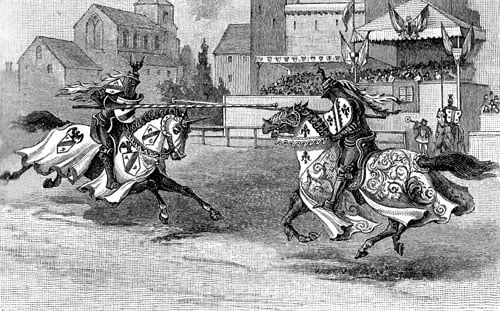Tiers
We bandy about the term tiers fairly often. They come up when we’re talking about how ‘hard’ an adventure is or how ‘tough’ a character is. But what are they? What are the differences between them? Let’s talk a little about leveling up.
Most players know a Tier One character is L1-L4. They refer to those characters as Local Heroes. They’re a bit more capable than the bouncer who breaks up fights at the local tavern. But, it’s unlikely anyone knows them beyond their own towns…for good or ill.
Maybe they’ve been on an adventure or two, or maybe they haven’t. They’re still getting to know the adventuring life. But, they’re basically apprentices who snuck away from their masters doing what amounts to borderline side quests. Until they get to Level Four, most things that go bump in the dark can still kill them if they aren’t careful. The things they accomplish aren’t likely to have much impact beyond the edges of the county they call home.

Risk and Reward
Sure, the farmer will be grateful that the crops are safe from bandits, and the mayor will be generous to the party that saved the children. But it is unlikely that their exploits will draw much attention unless they have offended someone in particular who might seek recompense.
But what happens after your noble adventurers have returned from clearing out that goblin horde or evil cult and they’ve finally amassed that magical 6500xp? Do they immediately feel that heady rush of power that comes with a pile of new skills and abilities, or do they have to go through some ritual or ceremony to gain all those (at least for them) game-changing abilities?
The goal of this article isn’t to provide all the answers but to help you add some depth to the progression at key points in your character’s advancement.
Level Five
Let’s get to know what that means and what happens when they get to the (for now) lofty heights of Level Five. As far as the game rules go, it all happens at once, like waking up after a long rest with your spells restored and hit points recovered. If your table is running many one-shots, then this might be the way simply because the party doesn’t spend a lot of table-time dealing with downtime, and you haven’t developed the surrounding environment.
You flip through the books, note down your character’s new abilities, and then head off on the next adventure. There’s nothing wrong with that. It’s quick and simple, and it gets the game going so the table can focus on the adventure at hand.
But what if there was a more fun way to deal with it? Something more characterful? Especially if your party is running an ongoing campaign? Is there a ceremony, and if so, is it public or private? Perhaps a celebration is held to recognize the paladin in the town square, while a rogue takes part in a masked ceremony in the hidden basement of the guild house.
Class Abilities
What if it required some level of effort to achieve all the benefits of leveling up to Level Five? A quest, perhaps? Does your character need to seek a mentor to train them in the ways of their class or to guide them on their quest? Is this mentor close at hand, or is a journey required?
Divine Servants
For the paladin or cleric, this may mean a public ceremony requiring a sign of devotion to their patron god. Likewise, a warlock may need to perform a service but in a less public location. Signs of devotion could vary from simple pledges of allegiance to defeating a troublesome opponent of their patron.
Protectors of Nature
For the ranger or druid, a similar ceremony could occur in a woodland grove or at the base of a towering waterfall. However, some events are limited to certain times, such as under a full or new moon. Will that mean they have to wait to receive their full range of new abilities?
Skilled and Talented
Guilds may call rogues and bards upon to perform a task that tests their new abilities to confirm they have earned their new place in the guild. Perhaps they need to gain access to something thought inaccessible? Perhaps their exploits have come to the attention of a rival guild, and challengers seek them out before they become too powerful.
Magic Researchers
Artificers may need to craft an example of their skills to prove themselves worthy…or perhaps they are called upon to understand and unravel the mystery of a rival artificer. An alternative could be a magic-fearing noble or guild leader looking for a technological solution to a problem normally solved by magic.
Warriors
Monks could be called upon to aid a local temple or shrine, or they could need to quest to learn from a master for a period. Fighters, and any martial class, if desired, could be challenged in a tournament. Anything from a simple pas d’armes trial that allows them to earn their spurs to a regional tournament at a festival sponsored by a minor noble.
Naturally Gifted
Sorcerers and Barbarians are trickier because so much of their class abilities come from their very nature. However, there are options for the wily DM. Societal or cultural pressures could impose expectations or obligations at the risk of being declared an outcast if refused. Barbarians could feel the need to prove themselves by slaying (or taming) a magnificent beast that threatens something dear to them.
Ancestral expectations
Ancestral customs could flavor the expectations and rewards associated with their class. For example, a dwarven or orcish druid may encounter greater challenges finding a mentor than an elf or half-elf. However, they may also gain additional rewards as tokens, equipment, or connections because their mentor acknowledges their accomplishments.
If gnomes ran the local thief’s guild, they might be reluctant to admit or train humans because of some unfortunate incident in the past. The ‘minor’ races could have societal expectations of any adventurer to use their abilities and connections to benefit their society. Failure to do so could cause mentors to withdraw their counsel or merchants refusing to sell equipment, tools, or spell components. Extreme penalties could extend to being cast out and refused sanctuary.
Some characters may also find their families and communities attempting to influence their path because they ‘know what’s best for them.’. This could mean gentle (or not so gentle) encouragement to multi-class (at best). Or, abandon their path in favor of a ‘more appropriate’ one (at worst). This could prove especially complicating for sorcerers or those whose abilities come from a divine (or infernal) source.
Likewise, disadvantaged ancestries or groups might be granted additional support because of numbers or social status in a region. This may come from groups or guilds seeking to cultivate a sense of loyalty that might not otherwise exist.
Social advancement
Beyond the simple mechanics of getting more attacks or more and better spells, there is an aspect of leveling up to a new tier that is often overlooked. As a character advances from Local Hero to Regional Heroes/Heroes of the Realm they will encounter more than just a different class of monsters. But, also a different class of contacts, patrons, and NPCs.
No longer will the town sheriff hire your intrepid party or pick up a quest from the local farmer’s guild. Instead, they may meet with a representative of the local Lord or Lady. In addition, the church may seek them out directly based on their previous exploits. Finally, at the higher levels of Tier Two, they will probably meet with the nobility and senior clergy themselves.
This means they are likely to need mentoring in politics and intrigue as much as swordplay and spellcraft. Now that they have achieved some renown, the people they meet will probably lead further up the social ladder in the future. Whether because the NPC is tasked with such responsibility or perhaps because they seek to curry favor with the characters or their employer.
While they’re at the tournaments and festivals proving themselves, they will meet and greet with an assortment of NPCs. Challengers may confront them on the lists. Depending on the outcome of the encounter, they may turn into allies or opponents in the future. In addition, Lords and ladies may seek them out for various reasons. From simple companionship because of their newfound celebrity to establishing contact for future use.
